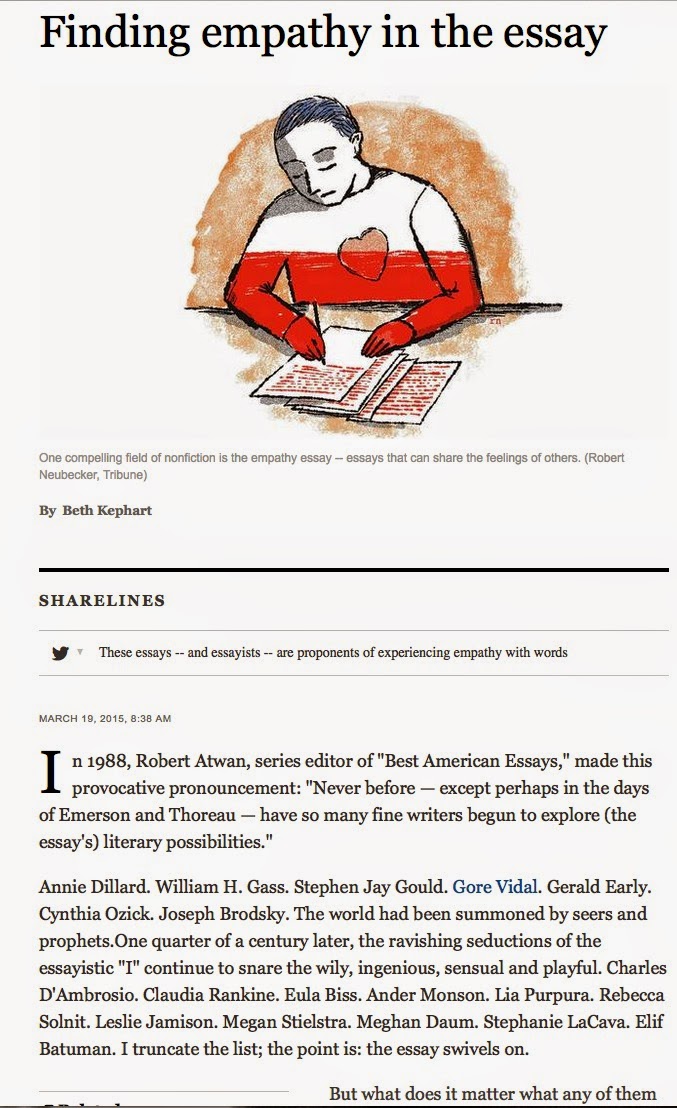Add a Comment
Viewing: Blog Posts Tagged with: Elif Batuman, Most Recent at Top [Help]
Results 1 - 8 of 8
Blog: Galley Cat (Mediabistro) (Login to Add to MyJacketFlap)
JacketFlap tags: Awards, Amanda Rea, Ashley M. Jones, Britteney Black Rose Kapri, Meehan Crist, Natalie Haney Tilghman, Vanessa Hua, Authors, Elif Batuman, Rachel Aviv, Rona Jaffe, Eula Biss, Add a tag
Blog: Beth Kephart Books (Login to Add to MyJacketFlap)
JacketFlap tags: memoir, empathetic imagination, Chicago Tribune, Meghan Daum, Elif Batuman, Ander Monson, Cynthia Reeves, Leslie Jamison, Megan Stielstra, Add a tag
A few weeks ago, I built tall piles of my many essay collections (old and new) and began to ponder. Rediscovered favorite pieces by Annie Dillard, Patricia Hampl, Ander Monson, Rebecca Solnit, the World War II pilot memoirist Samuel Hynes, Elif Batuman, Megan Stielstra, Stephanie LaCava, Joanne Beard, others. Looked for insights into the empathetic imagination—how it has been managed over time, how essayists, historically, have gotten to the heart of hearts that aren't their own. I read, took notes, looked for patterns, began to write. It was a three-week process that produced just over 1,000 words.
I am blessed that the Chicago Tribune took interest in this piece. I am blessed, too, that I was able to share these thoughts at Bryn Mawr College this past Thursday, in the classroom of the very exquisite Professor Cynthia Reeves.
The essay will appear in this weekend's Printers Row. The online link is here.
Blog: Galley Cat (Mediabistro) (Login to Add to MyJacketFlap)
JacketFlap tags: Elif Batuman, Paul La Farge, Elizabeth Rubin, Linda Colley, Uwem Akpan, Tea Obreht, Rajesh Parameswaran, Awards, Libraries, David Grann, Arthur Lubow, Anthony Grafton, Add a tag
The New York Public Library’s Dorothy and Lewis B. Cullman Center for Scholars and Writers has picked 15 writers and journalists as its annual fellows.
Selected from a pool of 313 applicants, this is the 15th class of fellows for the center. These writers will get a stipend, a private office in the Cullman Center and support from the library staff.
With a diverse array of people originally from Nigeria, Turkey, England, Argentina, and Serbia, the class of 2013 includes: The fiction writers Tea Obreht, Rajesh Parameswaran, Paul La Farge, and Uwem Akpan. The historians Linda Colley and Anthony Grafton. The journalists Arthur Lubow, Elizabeth Rubin, Elif Batuman, and David Grann.
New Career Opportunities Daily: The best jobs in media.
Add a CommentBlog: Beth Kephart Books (Login to Add to MyJacketFlap)
JacketFlap tags: Lynn Hirschberg, CK Williams, Elif Batuman, Lee Daniels, Oliver Sacks, English 135-302, Geoffrey Wolff, literary profile, Frederick Busch, Add a tag
Today in class, following our review of four student memoirs, we'll look ahead toward the literary profiles that the students will be writing as their final project. My instructions for the assignment are, as usual, simple enough (I include them below). Not quite as simple is shaping, with the students, standards of excellence, or measures against which such profiles might be judged. I loved, for example, Patti Smith's profile of Johnny Depp in a late 2010 issue of Vanity Fair precisely because of the rugged, empathetic nature of her questions; Smith knows fame, she knows yearning, she knows loss, and she knows Depp, and by going beyond what she already knew (by asking the piercing personal and philosophical questions) she gave us an indelible, original portrait.
In Misgivings: My Mother, My Father, Myself, the poet C.K. Williams brings psychological acuity and a poet's ability to parse to his intimate renderings of those who shaped his world. We know Williams's mother, for example, by what he tells us she withholds, and why. "When my father was undergoing his illnesses, his absentmindedness, his depressions, (my mother) somehow managed never quite to submit to them: although she sympathized with him, wished he were better, was, you could tell, a little offended without ever saying so by his not being better, she still never manifested what was happening as something that really possessed her; she always kept back that corner of her feelings that might have made her suffer too much."
In her introduction to The Possessed, Elif Batuman yields a portrait of the "first Russian person I ever met" that (by choosing just the right scenes, the right snips of dialogue, the dead-on, tell-tale italics) gives us an immediate sense not just of a man's infuriating but perhaps endearing idiosyncratic tics, but of the effect those tics had on Batuman herself. "Toward the end of one (violin) lesson, for example, he told me that he had to leave ten minutes early—and then proceeded to spend the entire ten minutes unraveling the tortuous logic of how his early departure wasn't actually depriving me of any violin instruction. 'Tell me, Elif,' he shouted, having worked himself up to an amazing degree. 'When you buy a dress, do you buy the dress that is most beautiful...or the dress that is made with the most cloth?'"
Oliver Sacks, especially in The Man Who Mistook His Wife for a Hat, makes effective use of clinical language and telling dialogue to bring his real-life characters to the page. Frederick Busch uses a novelist's touch—vivid, unexpected details, the lean of impression against the stacking of facts—to invigorate portraits of people like his father and Terrence des Pres. In The Duke of Deception, Geoffrey Wolff juxtaposes known facts against purported ones to give us a man, his own father, who sought to deceive all on every topic save for the power and importance of love.
I'm going to be reading segments from those books to the students today. Additionally, I've asked them to read, on their own, Lynn Hirschberg's New York Times Magazine profile of Lee Daniels, the so-smart, so-sensational, and (to use her word) audacious director/part producer of the Oscar-winning film "Precious" (among other things). The students have downloaded the Hirschberg story (in these waning days of being able to download NYT files, though, hey, I am a paper subscriber and will still have privileges) and, I hope, they've played the video o
Blog: Beth Kephart Books (Login to Add to MyJacketFlap)
JacketFlap tags: Rahna Reiko Rizzuto, Patti Smith, Darin Strauss, Hiroshima in the Morning, The Possessed, Elif Batuman, Half a Life, Just Kids, Vanishing Point, Ander Monson, Add a tag
I never read nearly as much as I'd like to read—my multiple worlds are perpetually colliding, fracturing time. But I was so gratified to learn that, on this year's list of NBCC nominees, many of the books I'd loved best and celebrated here, on my blog, are being equally celebrated by the judges. In Autobiography, there's Patti Smith's remarkable Just Kids, Darin Strauss's deeply moving Half a Life, and the thoughtful, provocative Hiroshima in the Morning, by my much-loved friend, Rahna Reiko Rizzuto. In Criticism, there's Elif Batuman's The Possessed and Ander Monson's Vanishing Point. I'd put all five books on my Penn syllabus months ago, and here they are—proven, lifted, upheld.
A huge congratulations to them all, and, especially, to my dear friend, Reiko. I've linked to my own reflections about these books here, should you be interested in how they affected me early on.
Blog: Galley Cat (Mediabistro) (Login to Add to MyJacketFlap)
JacketFlap tags: Uncategorized, Jennifer Weiner, Hilary Mantel, Elif Batuman, C. Max Magee, Michele Filgate, Add a tag
 Today The Morning News announced the roster for the annual Tournament of Books–a round robin competition that pits books against books every March. We’ve listed the complete roster of books below.
Today The Morning News announced the roster for the annual Tournament of Books–a round robin competition that pits books against books every March. We’ve listed the complete roster of books below.
A panel of judges will compare these books against each other, eliminating one book each round until there is a winning book. Last year, Hilary Mantel’s Wolf Hall topped the list.
Here’s more about the contest: “There will be surprises and controversies, upsets and kerfuffles. As usual, we’ll have our color commentators on hand to discuss the decisions, and our Rooster statistician will return to provide analysis and predictions. Then there’s you, the reader. Sometimes you’ll agree with the decisions, sometimes you won’t, and in both cases we hope you’ll voice your opinion in the discussion—which has become, as Salon critic Laura Miller put it last year, ‘a rare pocket of civility and informed intelligence.’”
New Career Opportunities Daily: The best jobs in media.
Add a CommentBlog: Galley Cat (Mediabistro) (Login to Add to MyJacketFlap)
JacketFlap tags: NaNoWriMo, Writer Resources, Elif Batuman, Add a tag
At the Whiting Writers’ Awards last month, we interviewed a few of the winners of the $50,000 prize. Author Elif Batuman shared some important advice to remember about National Novel Writing Month (NaNoWriMo)–it’s the perfect time to get bad writing out of your system.
Here’s an excerpt from the video interview: “My advice is keep writing. No time you spend writing will be wasted—even if you write something that’s bad. Everyone has a certain amount of bad writing to get out of their system. It’s important not to censor yourself and not to get upset or demoralized when you write bad stuff.”
Batuman won a nonfiction Whiting for her book, Possessed: Adventures with Russian Books and the People Who Read Them. Press play on the video above to watch. This is our fifteenth NaNoWriMo Tip of the Day. As writers around the country join the writing marathon this month, we will share one piece of advice or writing tool to help you cope with this daunting project.
New Career Opportunities Daily: The best jobs in media.
Add a CommentBlog: Beth Kephart Books (Login to Add to MyJacketFlap)
JacketFlap tags: The New Yorker, James Wood, Elif Batuman, Add a tag
 Yesterday, inspired by an Elif Batuman book and a James Wood essay in The New Yorker, I wrote about novel names. I absolutely adore those of you who shared your own perspective on this. Sarah and others wondered how I name my characters, and I will admit here that sound has so much to do with my decision making. Sophie suggests a particular kind of person to me—internally focused, quietly questing, curious. Riley, for me, is an artist. Tara is wise, winningly sarcastic, eager for the next thing. Like Melissa, I don't question a name once I find it, and I don't overly freight it with meaning. My own name, Beth, means House of God. That's a whole lot to live up to (I certainly haven't yet), and I've never named a character that.
Yesterday, inspired by an Elif Batuman book and a James Wood essay in The New Yorker, I wrote about novel names. I absolutely adore those of you who shared your own perspective on this. Sarah and others wondered how I name my characters, and I will admit here that sound has so much to do with my decision making. Sophie suggests a particular kind of person to me—internally focused, quietly questing, curious. Riley, for me, is an artist. Tara is wise, winningly sarcastic, eager for the next thing. Like Melissa, I don't question a name once I find it, and I don't overly freight it with meaning. My own name, Beth, means House of God. That's a whole lot to live up to (I certainly haven't yet), and I've never named a character that.
In focusing on names in this blog yesterday, I did not have the opportunity to quote from the beginning of the Wood piece ("Keeping it Real: Conflict, convention, and Chang Rae-Lee's 'The Surrendered'") which also struck me as rich with conversational possibilities. Here it is. I'd love your thoughts:
Does literature progress, like medicine or engineering? Nabokov seems to have thought so, and pointed out that Tolstoy, unlike Homer, was able to describe childbirth in convincing detail. Yet you could argue the opposite view; after all, no novelist strikes the modern reader as more Homeric than Tolstoy.... Perhaps it is as absurd to talk about progress in literature as it is to talk about progress in electricity—both are natural resources awaiting different forms of activation....
Wood goes on to make some very interesting statements about the "lazy stock-in-trade of mainstream realist fiction," but it wouldn't be fair of me to quote him at greater length here (buying magazines helps continue the livelihood of magazines). I encourage you to take a look. I'm eager for your reactions.







What a spectacular assignment! I would have an awful (but fantastic) time deciding on a subject.
I've said it before, but your students are SO LUCKY!!
:-) A.